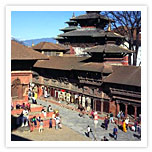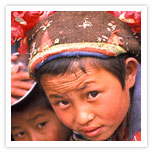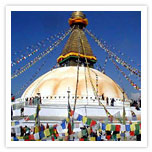Tours to Bhutan, Travel to Bhutan
- Bhutan Visitor Info
- Western Region Bhutan -
- Central Region Bhutan -
- Eastern Region Bhutan -
- Festivals of Bhutan -
- National symbols -
- History of Bhutan -
- Culture of Bhutan -
- Religion of Bhutan -
- People of Bhutan -
- Bhutan Visa & Customs -
- Bhutan Accommodation -
- Bhutan Transportation -
- Climate of Bhutan -
- Currency of Bhutan -
- Paro Festival Bhutan -
- Trekking in Bhutan -
Bhutan Mystic Bliss » Nepal Tours » Explore Kathmandu
Explore Kathmandu
For further Details Contact Us
Places covered : Kathmandu - Swoyambhunath - Patan - Pashupatinath - Boudhnath - Bhadgaon.
Highlights
of Explore Kathmandu
Kathmandu : Kathmandu Durbar , The
big bell , Kathmandu valley , Tibetan monasteries , Buddhist temples ,
Pashupatinath , Boudhnath Stupa , Patan.
 The
Kathmandu valley is the cultural and artistic heart of Nepal, and contains
some of the oldest and best-preserved cities in the world: Kathmandu, Patan
and Bhaktapur. The historical, cultural and artistic importance is so
immense that UNESCO has designated no less than seven World Heritage Sites
here, all of which our guests may enjoy at their leisure.
The
Kathmandu valley is the cultural and artistic heart of Nepal, and contains
some of the oldest and best-preserved cities in the world: Kathmandu, Patan
and Bhaktapur. The historical, cultural and artistic importance is so
immense that UNESCO has designated no less than seven World Heritage Sites
here, all of which our guests may enjoy at their leisure. Day 01. ARRIVE KATHMANDU
You could arrive into Kathmandu directly from Europe or take a connection through either India or the Far East. Upon arrival at Kathmandu airport, you will be met, assisted and escorted to your hotel by our representative.
After checking in, you can relax or just walk around on your own to get the feel of the city.
Stay overnight in Kathmandu.
Day 02. IN KATHMANDU
 After
breakfast proceed for half day sightseeing of Kathmandu city and
Swoyambhunath Stupa.
After
breakfast proceed for half day sightseeing of Kathmandu city and
Swoyambhunath Stupa. Kathmandu City: Kathmandu Durbar with its medley of temples and shrines is the traditional seat of the royalty where Kings are crowned and their coronations are performed. The big bell; Kal Bhairav Temple; Jagannath Temple with its erotic carvings on the temple struts; Kasthamandap - the temple believed to have built from the wood of a single tree and from which the city of Kathmandu derives its name, are some views you will enjoy on this tour. But on top of the list is the Kumari Ghar - the temple of the living goddess. For most of the year, the Kumari is available to greet people from the balcony of the temple. Photography is strictly prohibited here. Spend some time browsing through a typical Nepalese market place.
Swoyambhunath Stupa: These 2000 years old stupas are situated approx. 1.8 miles west of Kathmandu on a hillock overlooking the Kathmandu valley. This is one of the most glorious Buddhist temples. It is decorated with the famous "Buddha's eyes", and is surrounded by temples and Tibetan monasteries. Today you can relax or explore on your own.
In the afternoon visit Patan City.
Patan: Also known as Lalitpur meaning city of devotees is where you will visit the Patan Durbar Square with its exquisite architectural masterpieces depicting the Newar craftsmanship. Krishna Mandir - a stone structure with 21 spires; Hiranya Varan Mahabihar - the Golden temple; and Mahaboudha - a masterpiece in terra cotta, are some of the other highlights of the tour. After the tour you will continue to the Tibetan Resettlement Camp where Tibetan Refugees are rehabilitated. You will see women weaving carpets on the their looms.
 Stay overnight in Kathmandu.
Stay overnight in Kathmandu. Day 03. IN KATHMANDU
After an early breakfast proceed for half day sightseeing of Pashupatinath and Boudhnath.
Pashupatinath: Lying on the banks of the sacred Bagmati River, this is the country's most important Hindu temple, dedicated to Lord Shiva. It was built in 1696 with a two-tiered golden roof and silver doors and is famous for its superb architecture. Each year it draws numerous devotees from all over India.
Boudhnath Stupa: It lays approx. 5 miles east of Kathmandu. This is one of the largest Buddhist shrines in the world, dating before the birth of Christ. It is the religious centre for Nepal's considerable population of Tibetans and there are a number of thriving monasteries. This area is also referred to as 'little Tibet'.
In the afternoon visit Bhadgaon city.
Bhadgaon City: It is situated approx. 10 miles from Kathmandu and has an impressive number of artistic treasures. Rightly called 'a living museum', it is the most medieval city of the valley. It is situated at an altitude of 1401mts. Bhaktapur means the city of devotees. Pottery and weaving are its traditional industries. The Bhadgaon city one of the oldest medieval cities was the capital of Kathmandu valley during the Malla dynasty, until the 15th century.
Stay overnight in Kathmandu.
Day 04. LEAVE KATHMANDU
Breakfast at the hotel and transfer to the airport in time to connect to the flight for onward destination.






